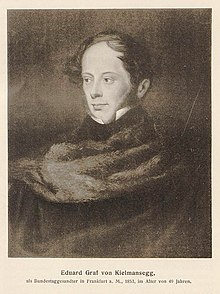Eduard von Kielmansegg

after an oil painting by Auguste von Schulte
Eduard Georg Ludwig William Howe Graf von Kielmansegg (also: Kielmannsegg , Kielmannsegge ; * February 15, 1804 in Hanover ; † March 6, 1879 in Blumenau near Wunstorf ) was Prime Minister of the Kingdom of Hanover .
Life
Kielmansegg was the second son of the royal Hanoverian top equerry Ludwig Friedrich von Kielmansegg and Frederike Eleanor, daughter of kurhannoverschen Field Marshal Count Johann Ludwig von Wallmoden-Gimborn born. Eduard von Kielmansegg was the head of the younger, north German, Protestant and counts of the von Kielmansegg family . He was married to Juliane von Zesterfleth .
He studied law in Geneva, Göttingen and Berlin. In 1825 he entered the Hanoverian civil service and in 1838 became a member of the chamber council.
Kielmansegg stood out above all for his advocacy of preserving the privileges of the nobility and against the liberalization of the Kingdom of Hanover.
On March 2, 1843, Kielmansegg was appointed cabinet councilor by King Ernst August . As a result of the unrest of 1848 Kielmansegg was ousted from this position. He then worked against the March Ministry and the constitution set up in 1848 in order to restore the lost nobility privileges, but initially had no success.
In 1853 he was the Hanoverian Bundestag envoy in Frankfurt am Main.
Only after George V became King of Hanover, his efforts were successful. On July 29, 1855, Kielmansegg was appointed Prime Minister and Minister of Finance and Trade. On August 1, 1855, he declared the constitution agreed in 1848 to be repealed and that of 1840 to be restored. He ruled in the interests of the nobility and in favor of the king. After a dispute over the introduction of a new catechism , Kielmansegg was removed from office on December 10, 1862. After his release he did not come out again in public.
After the Prussian annexation of the Kingdom of Hanover in 1866, he was imprisoned and went into exile in Austria. In March 1867, together with his wife, he secretly transported the Hanoverian crown treasure from Marienburg Castle to London. In 1869, the couple received the order from George V to pick up the crown treasure from London and bring it to Gmunden , which the Countess and her son Alexander also managed to do unnoticed.
According to the family contract of February 28, 1862, Kielmansegg was the owner of the Familienfideikommiss .
Kielmansegg died on March 6, 1879 in Blumenau.
family
He was married to Juliane von Zesterfleth (born February 15, 1808, † November 28, 1880) since September 4, 1832 . The couple had the following children:
- Alexander (August 13, 1833 - August 1914) ⚭ Sophia Philippa Sidney († May 12, 1907)
- Thedel (1836–1867) ⚭ 1863 Louise von Kielmansegg (1833–1901) (daughter of Ludwig Ferdinand Graf von Kielmannsegg auf giltzow (1798–1873))
- Oswald (1838–1896) ⚭ Leontine Countess Couple (1844–1912)
- Erich (born February 13, 1847; † February 5, 1923) ⚭ Anastasia Lebedewna von Lebedeff (* February 22, 1860; † February 20, 1912)
Some of his sons went over to the Austrian baronial and Catholic line.
Works
Together with his son Erich Graf von Kielmansegg , he gave a family chronicle of the lords, barons and counts v. Kielmannsegg ( digitized version ).
literature
- Erich Kielmansegg : family chronicle of the gentlemen, barons u. Count of Kielmannsegg . Manzsche kuk Hof-Verlags- u. Univ.-Buchh., Vienna 1910.
- Enno Schöningh: Kielmansegg, Eduard Graf. In: New German Biography (NDB). Volume 11, Duncker & Humblot, Berlin 1977, ISBN 3-428-00192-3 , p. 579 f. ( Digitized version ).
- Karl Wippermann: Kielmansegg, Eduard Graf von . In: Allgemeine Deutsche Biographie (ADB). Volume 15, Duncker & Humblot, Leipzig 1882, pp. 714-716.
- Klaus Mlynek : Kielmannsegg, Eduard Georg Ludwig William Howe Graf von . In: Dirk Böttcher , Klaus Mlynek, Waldemar R. Röhrbein, Hugo Thielen : Hannoversches Biographisches Lexikon . From the beginning to the present. Schlütersche, Hannover 2002, ISBN 3-87706-706-9 , p. 198.
See also
Individual evidence
- ↑ The Cumberlander Crown Treasure
- ↑ Daily news. Countess Anastasia Kielmansegg † .. In: Volksblatt für Stadt und Land. Weekly edition of the illustrated, independent daily newspaper “Die Neue Zeitung” , February 25, 1912, p. 4 (online at ANNO ).
| personal data | |
|---|---|
| SURNAME | Kielmansegg, Eduard von |
| ALTERNATIVE NAMES | Kielmannsegg, Eduard von; Kielmannsegge, Eduard von; Kielmansegg, Eduard Georg Ludwig William Howe Graf von (full name) |
| BRIEF DESCRIPTION | German Royal Hanoverian Prime Minister |
| DATE OF BIRTH | February 15, 1804 |
| PLACE OF BIRTH | Hanover |
| DATE OF DEATH | March 6, 1879 |
| Place of death | Blumenau near Wunstorf |
